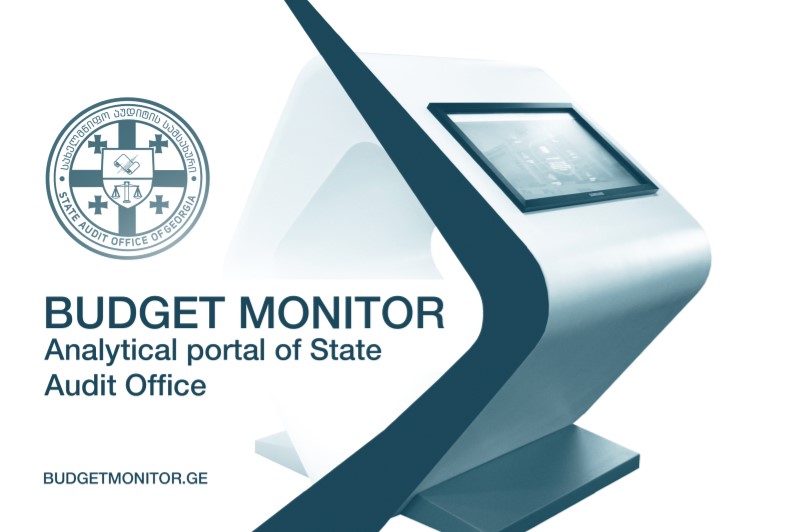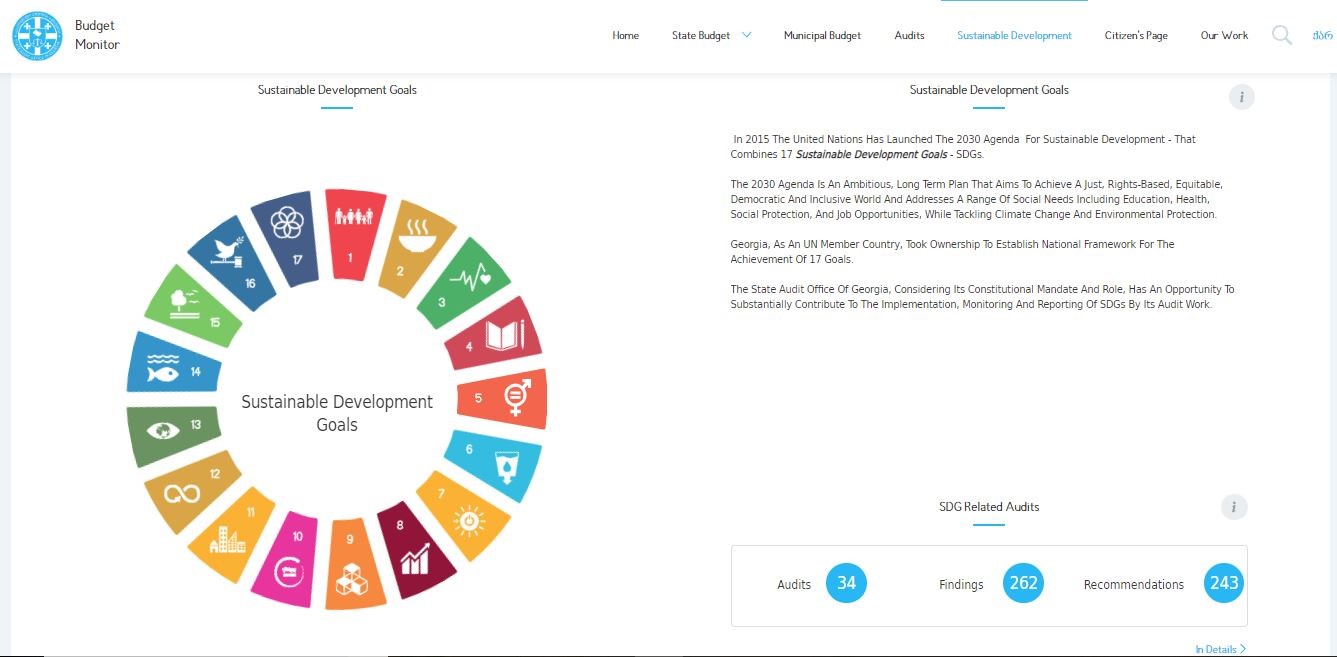Budget Monitor (BM) - innovative ICT tool of State Audit Office of Georgia (SAOG) - supporting SDGs (www.budgetmonitor.ge/en)
Description
Budget Monitor is an innovative ICT tool of SAOG that promotes sustainable development through increased stakeholders’ scrutiny. BM establishes two way communication with third parties by easy-to-interpret visualizations and dynamic graphs and enables citizens to get involved in audit process and contribute to improved public service delivery. BM’s SDGs page is the only national source that gives comprehensive information about the 2030 Agenda and SDGs to the stakeholders. This page provides information about SDG related audits, corresponding deficiencies and recommendations, that enables taxpayers to have objective picture about SDGs implementation in the country and contribute to sustainable development.
There are two main drivers of this innovation: <br />
1. SAOG as a supreme audit institution holds a critical role in SDGs implementation that is clearly articulated in UN Resolutions;<br />
2. Stakeholders: Parliament, citizens, media, and etc. were not aware about the 2030 Agenda/SDGs, that is against main principles of the Agenda. <br />
As SDGs are shared agenda for everyone, limited stakeholder engagement would hamper successful realization of the goals and would not guarantee that no one is left behind, as per the motto of the goals. On the other hand, informed stakeholders call for inclusive processes and hold the government accountable to tackle the problems grounded in people’s lived realities.<br />
SAOG, being aware of these challenges and corresponding urgent need (a) for its further contribution and (b) for filling information vacuum, came up with the idea aimed to increase awareness about SDGs and provide SDGs audit related information.<br />
As BM had already existed as an innovative ICT tool for citizen participation, SAOG used this opportunity and added a new page to the platform. Sustainable Development Page provides comprehensive information about the 2030 Agenda, SDGs and corresponding targets. This awareness rising feature is twinned with providing objective information about SDGs implementation. Precisely, through BM stakeholders get informed about the existing deficiencies in SDGs realization identified through the audits conducted on the central and local levels covering all 3 dimensions of sustainable development. In addition, taxpayers get information about the recommendations issued by SAOG to overcome the existing flaws. <br />
The distinguishing features of BM are not limited to the above mentioned specifications. Namely, through citizens engagement page taxpayers can express special interest in examining particular SDGs or inform SAOG about existing deficiencies in the programs/policies launched to meet the ambitious goals and offer ways to improve service delivery. SAOG applies predefined methodology to select and analyze SDGs, suspected wrongdoings and issue relevant recommendations. In addition, taxpayers can track the status of their request. <br />
Designing a special module to deliver SDGs audit related information puts extra pressure to the government as better informed stakeholders results in improved accountability and transparency that is a catalyst for enhanced efficiency. Thus, SDGs page doubles SAOG’s positive impact on sustainable development, as routine audit work is enriched with boosted stakeholders scrutiny.<br />
Above mentioned features of BM empower legislative and oversight leverage of the parliament, inform other stakeholders and enable their participation. Enhanced external control over the achievement of the goals would ultimately lead to improved national efforts to track progress, monitor implementation and identify improvement opportunities across the full set of the SDGs. <br />
The project takes into account all implementation principles of the agenda: National Ownership and Universality - by SDGs audit results holds government accountable for national policies; Human Rights Based, Inclusive and Participatory - establishes an inclusive and participatory process via enabling various stakeholders to be involved through Budget Monitor; Leaving No One Behind, Integrated - applies to Whole of Government approach via scrutinizing country level programs and corresponding cross cutting issues through different audit perspectives.
BM is exclusively operated and maintained by SAOG. BM is never in a static condition, SAOG team works to update and upgrade the platform continuously to comply with citizens interests. Adding SDGs page stands for a vivid example of this approach.
The concept of BM was originally developed by SAOG; its exact content and specific features were designed in close collaboration with multiple stakeholders. SAOG formed consulting working group, consisting of 14 CSOs working on PFM issues, and conducted a set of meetings with this working group, Parliament, municipalities, citizens and media, to receive their feedback on exact content of BM. As for financial assistance, SAOG obtained World Bank grant for the actual development of the platform.
As for the SDGs page, SAOG examined that there was not sufficient information provided about the 2030 Agenda by any alternative sources. Therefore, survey results showed that stakeholders were not aware about the SDGs. Thus, SAOG designed a user-friendly and useful approach to deliver SDGs related information to any interested bodies and added it to the before existed innovative ICT tool – Budget Monitor.
Generally, SAOG institutionalized BM operation framework. Hence, by clearly segregated duties and responsibilities throughout the entity, information is periodically updated on the platform in order to provide up-to-date and relevant information to the interested parties. Also, citizen requests are collected and analyzed on a permanent basis, in order to reflect them in the audit plan, considering their relevance and importance. Citizens can track the status of their request on the platform.
• SAOG examined risks in Public Procurement in several public agencies;
• SAOG identified deficiencies in Social Rehabilitation and Child Care program;
• SAOG assessed how appropriate was spending of Funds for Victims of Disaster.
Issued recommendations to improve the identified deficiencies are being fulfilled nowadays by the responsible agencies.
In addition, recent interviews with stakeholders showed that awareness about the 2030 Agenda/SDGs and willingness/readiness to be involved in budget oversight has been significantly improved.
Citizens, being familiar with the goals, required more transparency from the government agencies. Thus, responding to the increased demand for reporting, they started to deliver information with a higher extent by means of public meetings, round tables and etc. covering Gender Equality, Health Care, Transport Regulation and other topical issues.
It is worth to be mentioned, that BM was granted with multiple awards and recognitions:
• The Global Initiative for Fiscal Transparency Award, The World Summit Award, Georgia’s IT Innovation Award;
• Star Commitment of the OGP, The World Bank named the platform as one of the most reliable source of info, The British “Guardian” recognized its uniqueness and usefulness in regard with citizen engagement.
1. Willingness and drive to make changes – putting the idea into actual project requires dedication and belief that the project will make difference and the existing challenges could be tackled by putting substantial efforts;
2. Clearly set objectives and predefined development action plan – holding vivid vision about the aim of the project and putting substantial efforts in planning the process contributes to achieving successful results;
3. Communication with the third parties and considering their interests – holding intensive communication with stakeholders in order to meet their needs and provide useful information in a way that motivates them to be involved is another must;
4. Institutional framework to ensure sustainability of the project – there should be established formal framework related to roles and responsibilities of SAOG’s staff in order to ensure timely analysis, examination and update of the data.
As for the specific constraints and lessons learned:
1. Without having a solid experience in designing topic specific features, success still could be achieved as a result of acknowledging actual gaps and identifying methods to fill them;
2. Initially, when BM was launched, there was a lack of citizen participation due to lack of information about BM and its features. Thus, SAOG conducted awareness raising campaigns like presenting short films and meeting with stakeholders all over the country describing its usefulness and importance of BM for improved service delivery and integrity. As a result, BM experienced increased number of users and requests, but educating citizens about budgetary issues stays on-going challenge for SAOG. So, in case of SDGs page, there was substantial awareness about BM, and above mentioned challenges had already been tackled.
From the technical perspective, SAOG established a formal institutional framework related to roles and responsibilities of SAOG’s staff in order to ensure timely analysis, examination and update of the data.
What about replicability, SAOG’s BM, being a part of OGP Commitment, enjoys high recognition among different Supreme Audit Institutions (SAIs) and other international partners, as the experience was shared in multiple occasions in different countries. SAIs acknowledged the value of this ICT tool and expressed their huge interest and desire to elaborate similar platform. As SAOG is always ready to assist all interested parties and share experience about the elaboration of BM, close collaboration with other SAIs is undergoing in regard with designing similar ICT tool.
Successful implementation of SDGs requires an integrated approach, inclusive political processes, effective, accountable institutions and citizen engagement:<br />
• As a result of the project the parliament is enabled to have comprehensive information about the realization of the goals and can exhaust its legislative and oversight power to assist the implementation process;<br />
• By SDGs focused audit work, incorporating citizens interests, SAO would assist public entities to perform better and facilitate to inclusive sustainable development;<br />
• Increased awareness of citizens and other stakeholders about the 2030 agenda would raise demand for transparency and accountability. <br />
To sum up, enhanced awareness and engagement of parliament, citizens and etc. would establish better monitoring and reviewing processes. The project would assist the legislative, as well as executive branches of the government to achieve explicitly declared SDGs to end poverty and reach the furthest left behind, to forge new pathways to prosperity, peace and inclusion while preserving the environment.
SDGS & Targets
Deliverables & Timeline
Resources mobilized
Partnership Progress
Feedback
Action Network


Timeline
Entity
Region
- Europe
Geographical coverage
Photos


Website/More information
Countries

Contact Information
George Chakvetadze, Head of State Budget Analysis Unit
